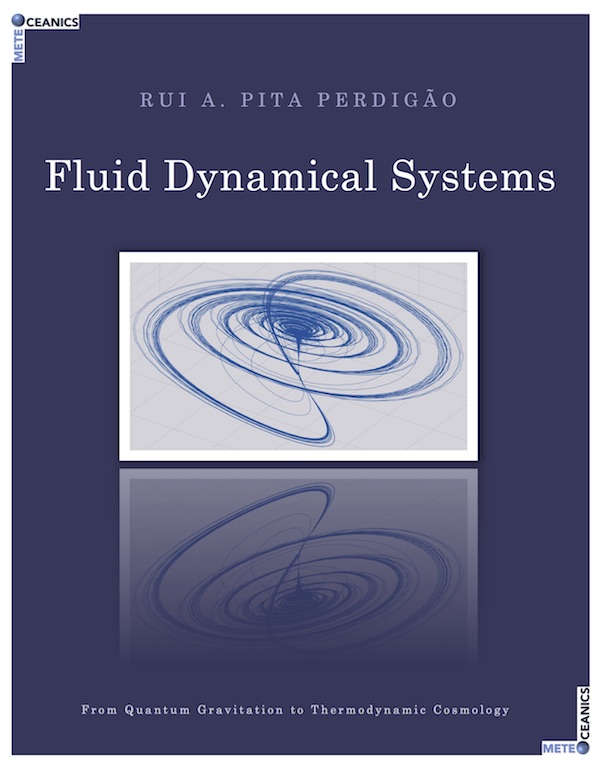The interuniversity chair in Physics of Complex Coevolutionary Systems and Fluid Dynamical Systems has been introduced by Prof. Dr. Rui A. P. Perdigão, stemming from his fundamental advances in generalizing the physics of complex dynamical systems beyond the classical ergodic stochastic-deterministic paradigms of dynamical system theories, in formulating new theoretical foundations beyond the traditional notions and horizons of fluid mechanics and complexity, and beyond the classical vs. quantum divide.
Rui Perdigão’s advances have brought out a new fundamental treatise on the mathematical physics of non-ergodic coevolutionary complexity, bridging nonlinear statistical physics, analytical mechanics, functional analysis, theoretical thermodynamics, information theory and differential geometry in a novel unified framework, seminal to new fields in physics and systems intelligence.
Rui Perdigão’s Fluid Dynamical Systems: from Quantum Gravitation to Thermodynamic Cosmology, provides a detailed account on that ongoing journey ‘stirring the waters’ of mathematical physics, reshaping its foundations along with interdisciplinary applications.
- Perdigão R.A.P. (2017): Fluid Dynamical Systems: from Quantum Gravitation to Thermodynamic Cosmology. https://doi.org/10.46337/mdsc.5091.
A new edition, updated with the latest developments from the author and centered on Finding Cosmos in Chaos in Coevolutionary Spacetimes, is in press.
The scientific relevance of this fundamentally new approach to Fluid Dynamical Systems ranges across the dynamics, analytics and predictability of complex coevolutionary systems — beyond the classical notions of fluid mechanics and beyond the traditional paradigms of stochastic dynamical systems.
The fundamental mathematical versatility of our take on Fluid Dynamical Systems enables the unified treatment of diverse problems ranging from quantum electrohydrodynamics to the coevolutionary earth system and astrophysical dynamical systems, shedding fundamental mechanisms and governing principles across spatiotemporal scales.
Special relevance arises from its central role in providing fundamental physical understanding and dynamic predictability to critical phenomena such as extreme events, including “black swan” behaviour unforeseen from past data records and from the ensemble of possibilities spun by classical dynamical system theories. We are taken on a journey to unveil hidden predictability in seemingly unpredictable phenomena.
Mathematical applications are also explored, ranging from advancing the kinematic geometry of space-time manifolds to the non-local differential geometry of fractal structures, and providing a more fundamental analytical background to probability theory, nonlinear statistics and information theory, including in far-from-equilibrium and non-ergodic coevolutionary settings in nonlinear statistical physics following recent advances by the author and program coordinator.
Engineering applications covered in the program include dynamic model design and decision support in the wake of environmental hazards and fluid-structure interaction challenges in a coevolutionary world. Moreover, they include structural-functional design and traffic optimisation for telecommunication and transportation networks.
Academically, these advances are already being delivered into Rui Perdigão’s frontier courses on Fluid Dynamical Systems, Complex System Dynamics and related disciplines. Since their inception, Rui Perdigão’s courses on Fluid Dynamical Systems have been held by himself in Vienna, Austria, later transiting and vastly expanding to his newly established interuniversity academic and research chair with full-fledged institutional structure and interdisciplinary scope.
The overall research and academic program of Fluid Dynamical Systems is now primarily hosted at the Meteoceanics Institute for Complex System Science, which is also headed by Rui Perdigão. The courses are delivered internally and at partner universities, along with variants tailored for relevant third party institutions interested in our work.
Following international invitations, Rui Perdigão’s academic programs also became available in condensed form through international courses, workshops and seminar series, aside from consulting packages to big data analytics, model design and risk assessment entities.
Despite the presently broad institutional reach, full exclusive rights to Fluid Dynamical Systems are still personally held by chair professor Rui Perdigão, including the academic programs along with associated research and technological innovations.
Rui Perdigão further launched and steers the recent initiative on Quantum Information Technologies in the Earth Sciences, termed QITES. Here we develop and bridge frontier research and development in Quantum Information Technologies, including Quantum Artificial Intelligence and Quantum Evolutionary Cognition, along with novel Sensing, Computation and Security capabilities, to address frontier challenges in the Earth System Sciences, including across socio-natural complexity, in a more realistically consistent, mathematically reliable and computationally efficient manner.
